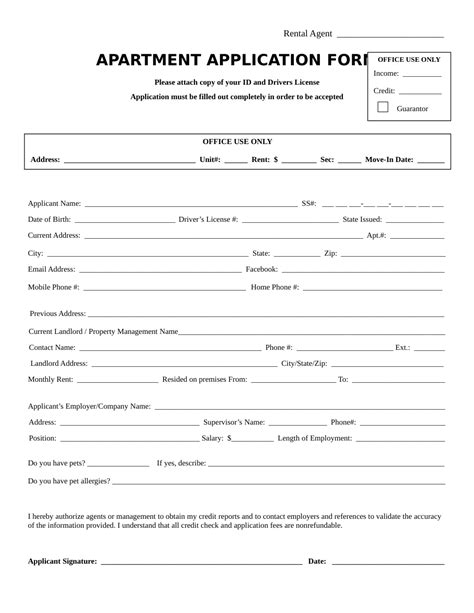Apartment hunting can be a thrilling experience, but it can also be overwhelming, especially when it comes to navigating the application process. Many renters are unaware of the potential pitfalls that can arise from signing an apartment application. In this article, we will explore three ways apartment applications can bind you, and what you can do to protect yourself.
Understanding Apartment Applications
Before we dive into the ways apartment applications can bind you, it's essential to understand what an apartment application is and what it entails. An apartment application is a document that prospective renters fill out to apply for a rental property. The application typically includes personal and financial information, such as employment history, credit score, and rental history.

1. Binding Lease Agreement
One of the most significant ways apartment applications can bind you is by committing you to a lease agreement. Once you sign the application, you may be required to sign a lease agreement, which can be binding for 12 months or more. This means that if you decide to move out before the lease is up, you may be liable for penalties or even the full amount of the remaining rent.
To avoid this, it's crucial to carefully review the lease agreement before signing. Make sure you understand the terms and conditions, including the length of the lease, rent, and any penalties for breaking the lease. If you're unsure about anything, don't hesitate to ask the landlord or property manager for clarification.
Hidden Fees and Charges
Another way apartment applications can bind you is by subjecting you to hidden fees and charges. Some landlords or property managers may include fees for things like application processing, administrative costs, or even "convenience fees" for online payments. These fees can add up quickly, and if you're not careful, you may find yourself owing more money than you anticipated.
To avoid hidden fees, make sure to read the fine print carefully. Ask the landlord or property manager to explain any fees or charges that you're not familiar with. You can also try negotiating the fees or asking if they can be waived.

2. Credit Score Impact
A second way apartment applications can bind you is by impacting your credit score. When you apply for an apartment, the landlord or property manager may perform a credit check to assess your creditworthiness. This can result in a hard inquiry on your credit report, which can temporarily lower your credit score.
To minimize the impact on your credit score, try to limit the number of apartment applications you submit. You can also ask the landlord or property manager if they can perform a soft inquiry instead, which won't affect your credit score.
Application Processing Time
A third way apartment applications can bind you is by taking a long time to process. Some landlords or property managers may take several days or even weeks to process your application, which can leave you in limbo. During this time, you may be unable to apply for other apartments or make plans for your move.
To avoid this, ask the landlord or property manager about their application processing time when you submit your application. You can also ask if they can provide you with a timeline for when you can expect to hear back about your application.

3. Lease Renewal and Termination
A third way apartment applications can bind you is by committing you to a lease renewal or termination process. Some leases may automatically renew if you don't provide written notice to terminate the lease. This can result in you being locked into a lease for another year or more, even if you don't want to stay.
To avoid this, make sure to review your lease agreement carefully and understand the renewal and termination terms. If you're unsure about anything, ask the landlord or property manager for clarification.

Protecting Yourself
To protect yourself from the potential pitfalls of apartment applications, it's essential to be informed and prepared. Here are some tips to keep in mind:
- Carefully review the lease agreement and application before signing.
- Ask the landlord or property manager about any fees or charges.
- Understand the credit score impact and try to limit the number of applications you submit.
- Ask about the application processing time and timeline for hearing back about your application.
- Review the renewal and termination terms carefully and understand your obligations.
By being aware of these potential pitfalls and taking steps to protect yourself, you can navigate the apartment application process with confidence.






What is an apartment application?
+An apartment application is a document that prospective renters fill out to apply for a rental property. It typically includes personal and financial information, such as employment history, credit score, and rental history.
How long does it take to process an apartment application?
+The processing time for an apartment application can vary depending on the landlord or property manager. It can take anywhere from a few days to several weeks.
What is a binding lease agreement?
+A binding lease agreement is a contract that commits you to renting a property for a specified period of time. It can be difficult to get out of a binding lease agreement, so it's essential to carefully review the terms and conditions before signing.
